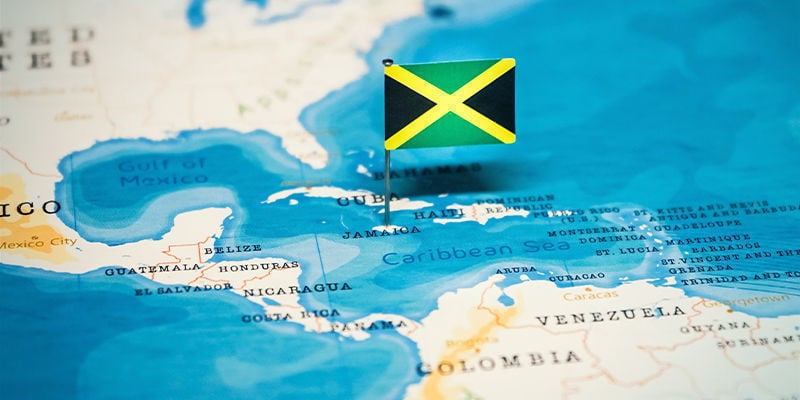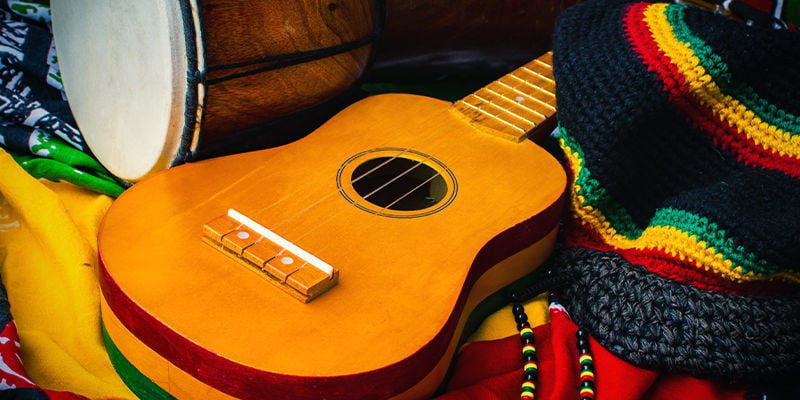
Weed Culture In Jamaica
Jamaica has the perfect climate and fertile soil for cannabis plants. It's no surprise that marijuana is so popular. But have you ever wondered exactly how Jamaican weed culture evolved? We've compiled all you need to know from the Rastas and Reggae icons to ganja's legal status.
HOW CANNABIS ARRIVED ON THE ISLAND
Jamaican culture and cannabis culture are intertwined like no other place on Earth. Join us on a journey through time to explore the true origins of weed culture in Jamaica. We’ve got the straight dope to report so blaze a spliff or a bowl whatever your pleasure because it’s time to get Rasta.
Like most former colonial possessions of the British Empire, the history of the island is dominated by genocide, oppression and slavery. The arrival of cannabis to Jamaica was certainly not by the design of the Empire; rather the sacred herb was introduced by Indian indentured servants in the mid 19th century.
In 1810 the British abolished slavery after at least 200 years in the human trafficking business, although most Irish historians would argue more like 700 years. West African slaves were routinely shipped to Jamaica to work the Sugar plantations right up to 1838 until a slave insurrection finally forced the granting of emancipation.
Plantation owners no longer had an infinite supply of labour and were facing a labour crisis. The imperialists had a real problem. One that was replaced by something scarcely better. During the period 1845-1917, approximately 40,000 Indian indentured servants were sent to Jamaica to toil the lands. To ease their burden all they had was hash and it was these poor souls that planted the first cannabis seeds in Jamaican soil.

GANJA ETYMOLOGY
The origin of the term “ganja” is actually derived from Sanskrit. Hindi Indians brought the cannabis seeds and the name for the herb to the Caribbean.
Fusion of Indian and African culture on the island gave rise to Jamaican ganja culture and the popularity of weed amongst the lower classes was soon to be turned against the natives by the imperialist ruling class.
The Opium Law of 1913 includes specific provisions for the thorough prohibition of ganja. This was weaponised legislation to target poor weed smoking Jamaicans, as the sanction for mere possession was “a penalty not exceeding one hundred pounds and in default of payment, to imprisonment with or without hard labour”, which is approximately €12,000 in 2017 money.
Needless to say, too many impoverished black Jamaicans found themselves banged up breaking rocks, for no good reason at all.
By 1948 the government was really shook by a religious movement on the rise with an affinity for ganja despite its criminalisation. In response, they unleashed the Dangerous Drugs Act of 1948.
This class warfare act empowered the courts to legally bury a weed smoker under the jail and/or strip them of all their assets.
The abhorrent section on ganja states that an offender can expect “on conviction before a Circuit Court, shall be fined not less than five hundred dollars for each ounce of ganja which the court is satisfied is the subject matter of the offence or to imprisonment for a term not exceeding thirty-five years or to both such fine and imprisonment”.
RASTAFARIAN CULTURE
The move didn't stop people, though, and ganja became ingrained in Jamaican culture. The roots of Rastafarian culture in Jamaica go back to the 1930’s and it is definitely not just a religion it is also a movement.
Undoubtedly Marcus Garvey, himself Jamaican born, and the black power movement, were a major influence, but the leader of the Rasta’s was their “King of Kings, Lord of Lords, Conquering Lion of the Tribe of Judah” Emperor Haile Selassie I of Ethiopia. Ruling for the period 1930-1974 until he died.
Before he took the throne in 1930 his title was Ras (King) Tafari and “the most high” is still revered as a Christ incarnate figure in Rasta culture today.
The Rasta good book is also the Bible, although they consider it corrupted, and Zion (Ethiopia) is their “promised land”. Materialistic western society is shunned and referred to as “Babylon”.
Similar to Christ, the Emperor was also the leader of a hybrid of monotheist religion and radical political movement. Pan-African unity and raising consciousness was the core objective and this is what the Jamaican government really feared.
Rastafarian culture is much more than dreadlocks and ganja. Rasta’s have developed their own language in line with their uplifting philosophy and recognise the power of words. A Rasta won’t feed negative forces with his/her words.
The Rastafarian doesn’t use words like “understand” or “undertake”; a Rasta will infuse positivity swapping out the under for “overstand” and “overtake”.
Adding “I” in front of words is also typical Rasta lingo and giving them new meanings is also common, banana is “inana”. The “I” represents Jah (God) and it’s addition to words brings a divine connection with a higher power to the Rastafarian vernacular.
Naturally, ganja is a sacrament for the Rastafarians - even the passing of the sacred herb in a particular direction has meaning for the Rasta’s. A “reasoning” session is a therapeutic ganja group smoke and communion with Jah all in one.
Passing clockwise is usually associated with discussion of moral dilemmas/issues, while a counter-clockwise spliff rotation is reserved for wartime parlance.
Ganja also obviously has a role to play in Rasta celebration ceremonies. A “binghi” or “grounation” is effectively a Rasta Holy day and celebration. Ganja consumption is accompanied by a mixture of song, dance and prayer.

BOB MARLEY
Bob Marley became a legend in his own lifetime, he was that rare blend of Artist and Advocate that comes once in a generation. From humble beginnings, born in 1945, spending his childhood in Nine Mile and his teens in Trenchtown, he would grow up to become a cultural icon.
It was in 1960’s Trenchtown that Bob Marley, Bunny Wailer and Peter Tosh incubated the future Reggae sound and formed a band. Bob was born a Catholic but converted to Rastafarianism in 1966.
This was a turning point in Bob’s life; the beautiful symmetry of music and marijuana that would catapult him to stardom was born. The influence of the legend is still potent in the 21st century.
On what would have been Bob’s 70th Birthday 26th February 2015 ganja was decriminalised in Jamaica, and in a fitting tribute, medicinal and religious use was finally legalised too.
And while we are on the topic of legalisation, let's mix it up with a little trivia. Did you know that the famous Bob Marley song “legalize it” is actually a Peter Tosh jam written and performed in 1979 some five years after the Wailers broke up, well it is and it was news to us too.
NEW LAWS
Following the passage of the Dangerous Drugs (Amendment) Act 2015, a historic solemn ceremony was held on 29th April 2015 at the University of the West Indies. A lone cannabis plant was placed in the soil legally for the very first time in Jamaican history.
The new legislation is unlikely to have a massive impact on the average Jamaicans ganja consumption one way or the other, nor will it lead to a massive upsurge in new ganja smokers.
Rather this legislation is the first step toward a vibrant legal cannabis market, and although international treaty obligations are still barring the path toward global trade, a domestic industry can still thrive.
Tourism is a huge contributor to the Jamaican economy and a new boom in Ganja-friendly accommodation and holidays is well underway.
The “Bud & Breakfast” concept is already hugely popular with US tourists. Jamaica is on the verge of a green revolution that has the potential to make this small island nation a major player in the coming global ganja marketplace.





 United States
United States












